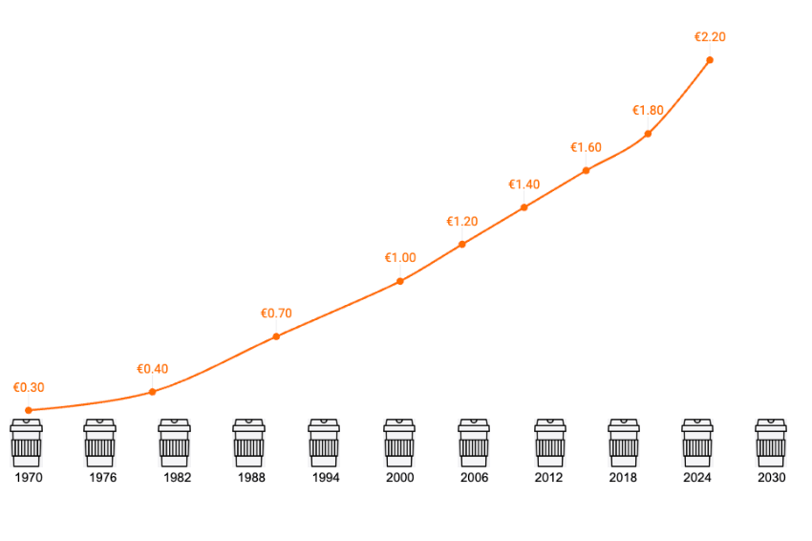Inflation, Inflation, Inflation
3 min read
Why is Everyone Talking About Inflation?
Hello
Whether you're glued to the news or just overhearing random chatter, you've probably heard people buzzing about inflation.
Pretty much even if you haven’t been paying the least amount of attention to anything, you’ve definitely seen and heard good and bad banter about inflation.
Oooohhhh, Inflation. Such a nice word. The term originates from the Latin word inflare which means to blow into or inflate.
It’s an evergreen hot topic, always there in the financial world, in your day-to-day life. Pretty much ingrained in every fabric of the society. Globally.
Inflation impacts EVERYTHING around us. From the cost of mere, harmless, good for your body coffee to your landlord’s monthly demand of his righteous rent and even the value of your small monthly paycheck to continue corporate slavery.
So, what exactly is inflation, and should you even care?
Let’s diggg!
What is Inflation?
Inflation is the rise in prices of goods and services over time. For example, if a cup of coffee costs $1 today but $1.10 next year, that’s inflation; specifically, a 10% increase.
Formula = [(1.1 / 1) -1] *100 = 10%
$1 today → +10% inflation → $1.10 next year (Today $1 multiplied by a 10% increase in a year’s time = next year price of coffee at $1.1)
Here’s a fun way to see inflation in action:
In the 1970s, a cup of coffee cost about $0.3.
In the 2000s, that same cup averaged around $1.00.
Today, it might cost anywhere from $2.20 to $4.50.
That’s inflation at work; prices steadily increase, and the value of money decreases over time.
Why is Inflation a Big Deal?
For decades, inflation in most countries has stayed within a manageable range, typically between 1% and 3% annually. This means prices rose slowly enough for most people to adjust.
But recently, inflation has surged to higher levels, like 22% in Estonia in 2023, for example. When inflation rises this fast, it grabs everyone’s attention.
Why? Because it directly affects your daily life:
🛍 Groceries cost more.
🏠 Rent increases.
💡 Utilities get more expensive.
At the same time, salaries often don’t rise as quickly as inflation, leaving people with less buying power. Read this line again. And again. And again
Salaries rarely rise as quickly as inflation, leaving people with less buying power
Salaries often don’t rise as quickly as inflation, leaving people with less buying power
Salaries never rise as quickly as inflation, leaving people with less buying power.
#CorporateSlavery
How Does Inflation Impact You?
Let’s look at a practical example of how inflation might hit an average household:
☕ Coffee costs more: A tiny price hike, like $0.50 per cup, adds up to hundreds of dollars a year. And you don’t even notice 👀
🏠 Rent skyrockets: A $100 rent increase means you cut back elsewhere or just accept it 🤷♂️
💼 Wages lag behind: If your salary grows at 3% per year but inflation is at 8%, your “real” income is shrinking. And your oblige like a good ‘ol employee 👔
This squeeze on your budget is why inflation feels so frustrating, it impacts your ability to save, spend, and maintain the SAME quality of life.
Is High Inflation Always Bad?
Not necessarily. A small, steady inflation rate (~2%) is actually healthy. It fuels spending, business growth, and economic expansion.
But when inflation rises too quickly, it creates problems:
❌ Salaries Can’t Keep Up: People feel poorer because their income doesn’t stretch as far.
❌ Savings Lose Value: If inflation outpaces the interest rate on your savings account, the value of your money shrinks over time.
❌ Higher Living Costs: Essentials like rent, groceries, and transportation become harder to afford.
What’s the Role of Central Banks?
To keep inflation in check, central banks (like the U.S. Federal Reserve or the European Central Bank) step in. Their primary tool? Raising interest rates.
When interest rates go up:
Borrowing becomes more expensive, so people and businesses cut back on spending.
Demand decreases, which helps stabilize prices.
Smart people start putting more and more of their ideal cash in bank savings and fixed deposits to protect their money from losing value. You should be smart.
The Sweet Spot for Inflation
Most economists agree that a 1.5% to 2.5% inflation rate is ideal. At this level, prices rise gradually, businesses can grow, and salaries have a better chance of keeping pace.
Why Should You Care?
Inflation impacts nearly every aspect of your financial life, whether you realize it or not.
💰 Budgeting: Rising prices mean you may need to adjust how much you spend on essentials like rent, groceries, and transportation.
💰 Saving: Inflation eats away at your savings, so investing or high-yield accounts are key.
💰 Salary Negotiations: Understanding inflation can help you advocate for fair raises that keep up with the cost of living.
The Bigger Picture
Think of inflation as a reminder of why financial literacy matters. Knowing how it works helps you make smarter decisions, whether it’s negotiating a pay raise, choosing where to live, or deciding how to save for the future.
So next time you sip your overpriced coffee, remember: inflation is always at work. But if you stay informed, you stay in control.
Stay curious and financially smart,
Riz


